COVID NSW: Health alerts for Hurstville, Bexley North, Beverly Hills
NSW Health has issued new venue and transport alerts after the first COVID case in the community in 55 days. See the venue list here.
NSW
Don't miss out on the headlines from NSW. Followed categories will be added to My News.
NSW Health has issued isolation orders for patrons of a Beverley Hills pancake restaurant after revelations that a hotel quarantine security guard may have been in the community for a week after being infected with COVID-19 while at work.
Pancakes on the Rocks on King Georges Rd in Beverley Hills was closed and being deep cleaned yesterday after NSW Health revealed the 47-year-old man, who has become the state’s first confirmed case in 55 days.
Anyone who visited the restaurant on Saturday, March 13, between 10.45am and 12pm is considered a close contact who should immediately be tested and isolate for 14 days regardless of the result.
NSW Health has also released a list of venues and transport routes and times for patrons, who should monitor for symptoms and, if they appear, get tested and isolate.
The alerts come as health officials ordered more than 100 colleagues of a security guard who was infectious with COVID-19 during a 12-hour shift at a quarantine hotel into self isolation.
The security guard — who does not have symptoms but who received his first dose of the Pfizer vaccine earlier this month — was identified as COVID-positive as part of daily surveillance testing of hotel quarantine workers.
However that testing is only done on days when staff are working in the quarantine system.
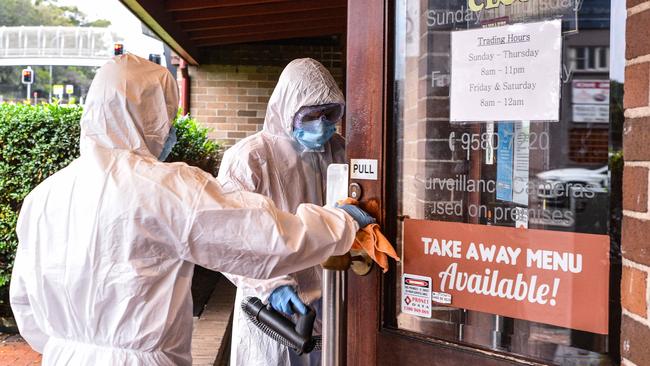
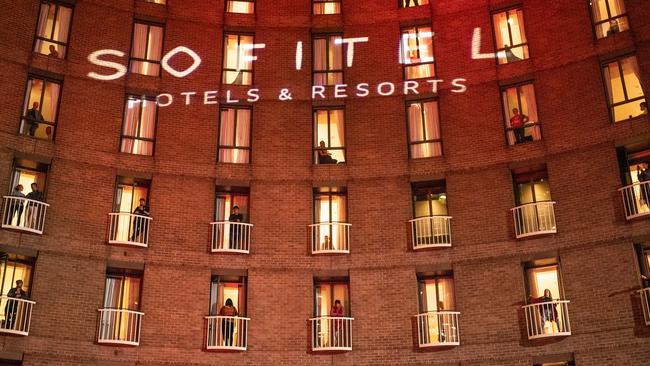
That window is considered a likely exposure site for the security guard.
The man — who works in hotel quarantine on weekends at the Sofitel and the Mantra in Haymarket — was then tested again on his next shift, Saturday March 13, returning a positive result.
Around 130 people have been ordered to self isolate and get a COVID test following the result, NSW Chief Health Officer Dr Kerry Chant said.
The man has another workplace during the week.
“We will alert the public if there’s any risk to the public, associated with that workplace,” Dr Chant said.
The man’s family has so-far tested negative.
Asked directly whether hotel quarantine workers should be subjected to daily saliva tests while not on shift, Health Minister Brad Hazzard said that the surveillance tests are “doing the job they need to do”.
“Every decision that we’ve taken here in NSW has been predicated on the very best advice that is from Dr Chant and her team,” he said.
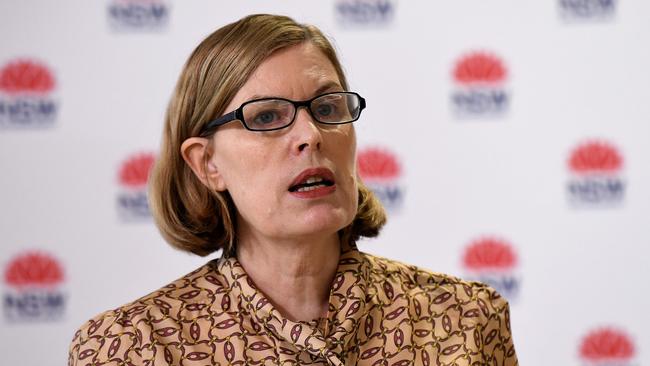
“In terms of where this person acquired (the virus), as the Minister (Brad Hazzard) indicated, this gentleman, who works in our hotel quarantine systems, generally works on the weekend,” Dr Chant said.
“(He was) was infectious while doing a shift and we have contacted around 130 people who worked from 7pm on Friday night to 7am on Saturday, overlapping that March 12 to March 13 (window).
“We are asking those individuals to immediately self-isolate and get a test. Basically, that allows us time to work through and ascertain the nature of interaction that this security guard had with those quarantine workers.
“We have a system where people (use) QR codes when they sign into work, and that presents a very effective way for us to reach out to those individuals.
“They will be followed up by a phone call, so that information has gone out to those individuals.”
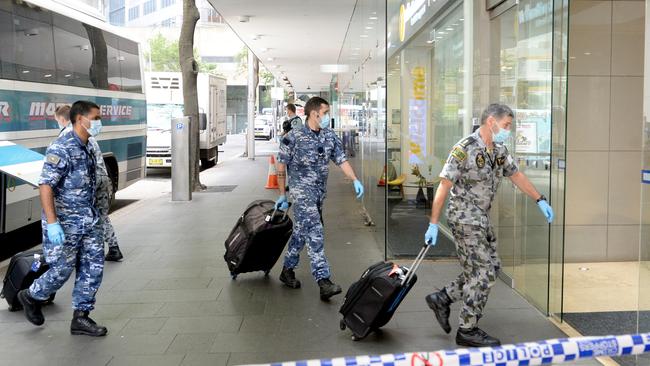
Four household contacts of the 47-year-old man have recorded negative results.
Contact tracers are also racing to determine whether any colleagues at the man’s full-time job were exposed
“This gentleman does have another workplace, and we are just looking at that,” Dr Chant said on Sunday.
“The advice we have had is generally that person resides in an office-based setting, but we are checking with various key cards and other things to track the movements and identify the potential.”
Dr Chant confirmed the affected venues were not considered high-risk at this stage but admitted the venues list could grow.
“At the moment we think these venues are low-risk but what we‘re doing is reviewing CCTV footage to refine the information,” she said.
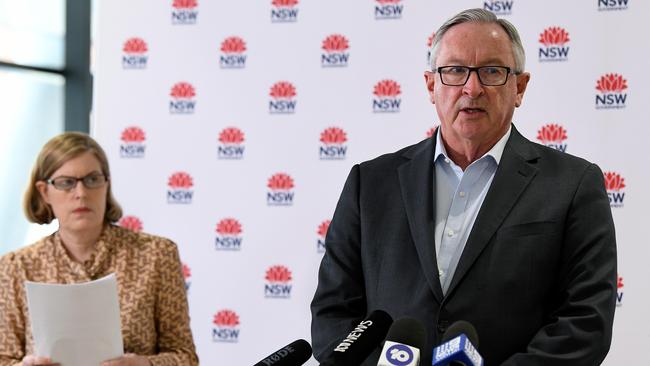
“We will be using a text (message system) to patrons who have used the QR codes for these venues. It is likely some additional venues will be identified, and also, there are some additional investigations. ”
The 47-year-old man’s positive test came despite the guard receiving his first dose of Pfizer vaccine on March 2.
PM AND CREW GET SECOND SHOT
Prime Minister Scott Morrison said the case was not a cause for serious concern in context.
However Mr Morrison, who on Sunday received his second dose of the vaccine, said it showed there was still a need to practice social distancing rules and also wear a mask, even after receiving the vaccine.
“They are a very small minority of cases,” he said.
“I’m not disturbed by it, I’m not surprised by it because you would expect these things to happen on the odd occasion.”
Chief Medical Officer Professor Paul Kelly said it was “unusual” for a person to get the virus after one jab of the vaccine but not unexpected.
“This is not a silver bullet that is going to fix everything right away,” he said.
Prof Kelly said there would be a “small proportion” of people who get the jab who get “mildly sick” but they would be fully protected against serious illness.
Mr Morrison again joined Sydney aged care resident Jane Malysiak — who became the first person in the country to get the vaccine — to receive the second Pfizer jab.
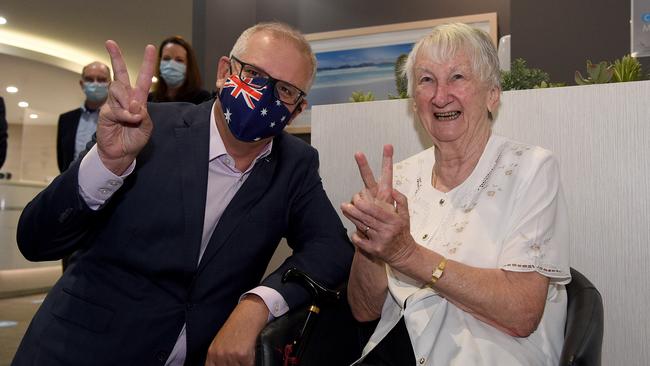
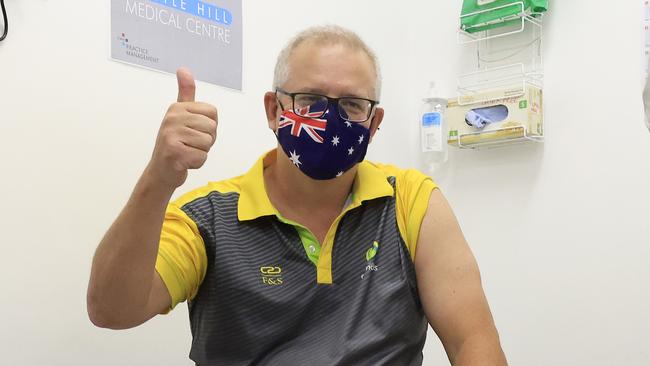
A nurse, GP, frontline workers, aged care and soldiers were among the 20 Australians to receive their first Pfizer dose on February 21, and were also due for the next jab in line with the three-week gap recommended by the Therapeutic Goods Administration (TGA).
More than 125,000 people in Phase 1A of the rollout, which includes aged care residents and essential front line workers, have been given their first jab.
About 40,000 residents across 437 aged care facilities have also been vaccinated with their first dose.
Later this month the program will move into Phase 1B, which covers about six million people including elderly people living in their own home and all other healthcare workers.
As the rollout expands, the Department of Health has launched a new website to bust “myths” around the COVID-19 vaccine, called “is it true?”.
Mr Morrison said the site would provide “trusted” and “credible” information on COVID-19 vaccines for everyone in Australia.
“It will sort the fact from the fiction,” he said.
160,000 JABS ALREADY DELIVERED
Australia has delivered about 160,000 COVID-19 vaccines in the first two and a half weeks of the rollout.
New figures show NSW has delivered 36,820 jabs as of March 12, almost a third of the 159,294 vaccines given out nationally in that time.
The federal government has delivered 38,934 jabs to aged care and disability care residents across 429 facilities.
Victoria has given 30,298 jabs, Queensland has hit 18,411, West Australia is close behind with 17,692 and South Australia has delivered 6,590.
Following them is Tasmania with 3,667 jabs, the Northern Territory 3,519 and the ACT with 3,363.
With vaccines in short supply, larger states are allocated a greater share of the available jabs to deliver, while the smaller jurisdictions are given less vials.




